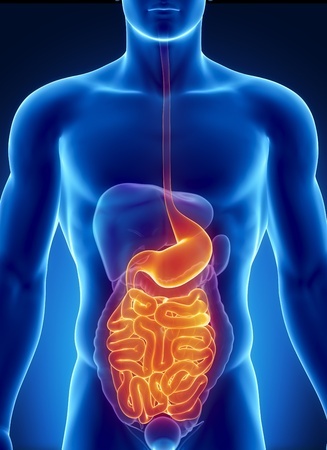The longer I practice the more I see just how important the digestive system is to ensuring optimal health. Even in chronic pain syndromes the condition of the digestive system is important because it plays a significant role in the ability of the body to heal. The GI tract has long been emphasized as a focus of concern in Traditional Chinese Medicine (TCM). It even was a primary focus in early Western Medicine. In most chronic health conditions physicians of old aided by the old saying: “First treat the gut”.

It seems that this should be self-evident, that the digestive system and what we put in it is of paramount importance in achieving and maintaining health. But somehow in modern times we have lost this wisdom and operate as if this hardly matters. As a culture we tend to act as if most health conditions have no root in digestive health. Consequently we feel free to put all manner of “junk food” in it under all sorts of adverse conditions. And oddly enough, this sort of behavior is widely practiced amongst the ranks of (so called) health care professionals, whose obesity rates are similar to the general public. My perspective is that ignorance of the health of the digestive system is truly the road to ill health; no pill or procedure will substitute for proper eating and supportive digestive habits. And though our modern system has conditioned us to rely on someone else to provide our health care, at the end of the day, we are the only ones that can take responsibility for nurturing our own digestion.
The subject of what we should be eating is a complicated one. From the TCM perspective, food is medicine and should be prescribed accordingly. In other words, your constitutional and/or current health condition should dictate what you eat. It is true that there some fundamental principles that all humans would do best to adhere to, which, by the way, don’t include eating all sorts of processed meals, snack foods, and sugary beverages. But it is not appropriate to dictate one single diet for all humans just as it would not be appropriate to prescribe the same pharmaceutical drug to each individual; yes, even aspirin.
However, there are some principles of eating that will enhance the digestive health of most everyone and that is what I would like to focus on here. In the TCM tradition much attention is given to preserving the stomach Qi (pronounced: chee). This word represents the functioning of the stomach and entire digestive system. In this sense it might be equated to the word “metabolism”. In the Ayurvedic system of medicine, the traditional medicine of India, this same concept is called “agni”, the “digestive fire”, which is somehow more visceral (pardon the pun) and seems to get the idea across better. It is important to understand that these terms imply that digestion involves the whole GI tract and that digestion doesn’t just happen in the stomach. Digestion begins in the mouth, followed by the mixing of food with digestive juices in the stomach. The process continues with the passage of partially broken-down food into the small intestines where further breakdown and absorption into the blood stream occurs. This stage requires enzymes from the pancreas, which can easily get worn out from too many sugar/carbohydrate foods in the diet (think: diabetes type II). The large intestine contains the majority of the friendly gut bacteria that further help digestion and produce chemicals that support the immune system throughout the body. This is one of the critical areas where too much of the wrong kind of food can contribute to a compromised immune system.
The last stage of the digestive tract is proper elimination, without which we poison the body. And although this is considered the end of the line in western biomedical concepts, the traditional systems take the digestive process one step further. They include the transportation of nutrients all the way to the end user, the cells of your body, which are estimated at around 100 trillion! And just like with any long distance travel it is not enough to just pack your bags and get in the car. You have to also take the journey, which can be delayed or impeded at numerous points along the way. So even though your food might be broken down properly and get into the blood stream, it still needs to get in the cells. In the traditional medicine systems, impaired assimilation is also impaired digestion. But by practicing habits that increase the digestive fire we can increase the chances that food not only gets broken down but also gets transported to all the tissues and cells of the body we want to nourish.
As you can see, digestive health is important part of your body’s over all health and plays a significant role in the healing process. The more you understand about your digestive health the better choices you will make. We’ve really just scratched the surface here so in order to help you optimize your digestive health we’ll be posting weekly tips to help you make better choices.
